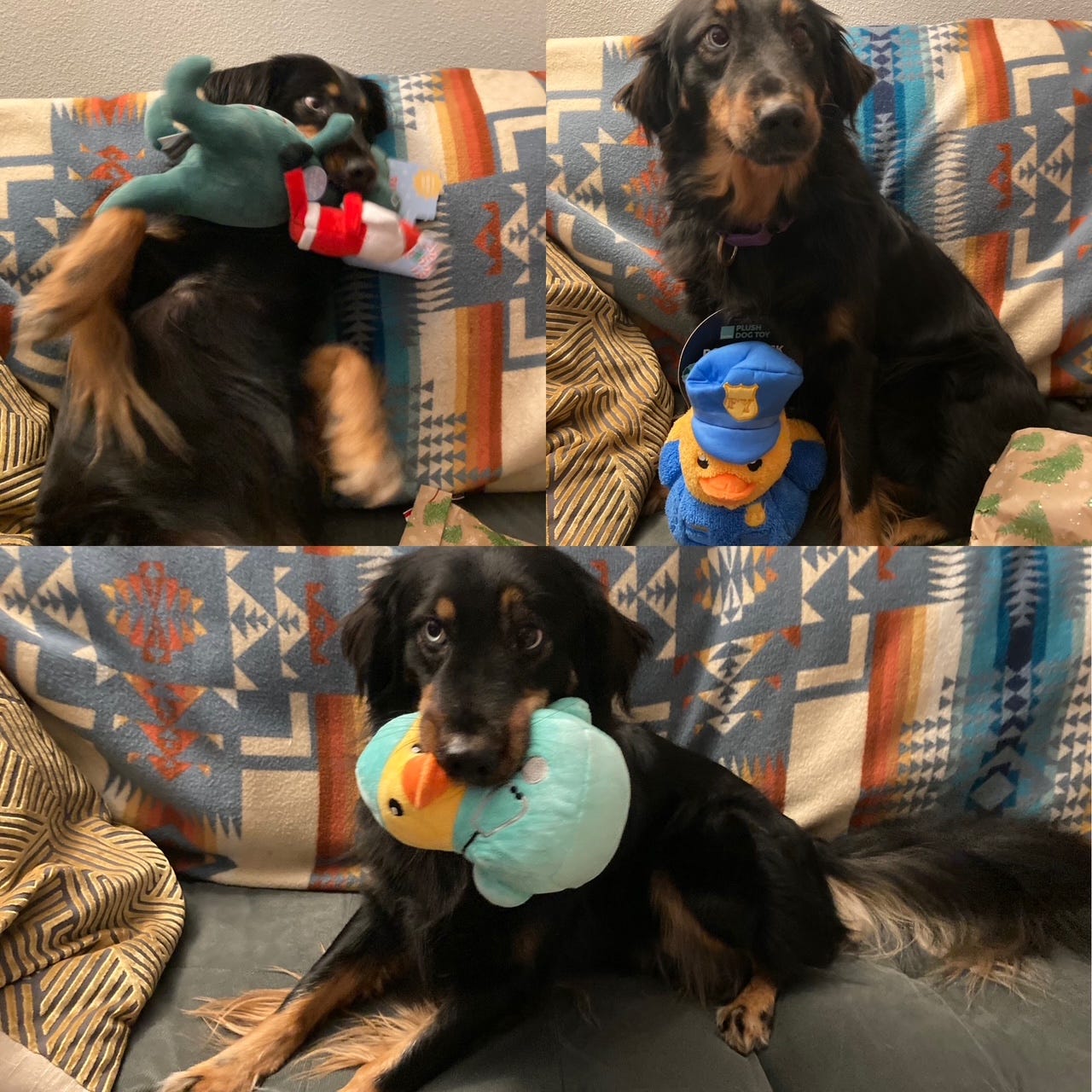One of the first things we bought Pants after bringing her home was a rainbow-colored rope toy. We presented it to her with great anticipation: our previous pups Sammy and Brie both loved to play tug-of-war, and we couldn’t wait to recreate that fun with Pants.
She looked at the rope, then back at us, nonplussed.
Pants did not know how to play.
A few days later, my sister came over to meet Pants. If anyone could teach our new pup to play, it was my sister. She’d been a dog trainer, groomer, and vet tech for nearly two decades.
Sure enough, within minutes, she had Pants excited about the rope! Pants got ahold of it and scampered under the table, where she commenced gnawing.
But playtime wasn’t over yet. My sister reached for the toy and…Pants put her teeth on my sister’s hand. It was a warning: this is mine now. Back off, or else.
My sister, who is made of steel, didn’t even flinch. She knew somehow that Pants would not follow through on the warning and bite her. She left her hand there calmly until Pants withdrew, and then my sister took the toy.
What Happened?
In that moment, Pants was resource guarding. When a dog perceives something as a valuable resource (such as food, a toy, a bed, or even a person), it may protect it with warnings or aggression, depending on the situation, training, or history of the dog. The important thing to note here is what the AKC says: “It only matters what [dogs] think might be a threat to their items. Dogs are responding to the trigger, not the actual action.” What matters isn’t the real scarcity or threat—it’s the perception of scarcity or threat. Ten minutes prior, Pants had never even played with a toy before, but now, it was a precious resource that she’d wrestled from the strange human, and now the human was trying to take it away.
Guess what? People do this too.
I mean, we don’t go around biting people for snatching one of our French fries (well, I do, but that’s beside the point), but we do something quite a bit more complicated: emotional resource guarding.
Emotional Resource Guarding
Emotional resource guarding is the breaking point when we feel overwhelmed by external demands or internal experiences of emotion. It’s when you yell at your kids right after finding out your mom has a suspicious breast lump. It’s when your brother treats you like the enemy during the settling of your parents’ estate. It’s when you simply cannot handle one more customer asking you for one more thing. In other words, emotional resource guarding is when we attack others for perceived emotional threats because we don’t have enough emotional energy to meet their needs. We feel, consciously or unconsciously, a sense of scarcity, which means any additional ask is a threat to our survival.
What matters isn’t the real scarcity or threat—it’s the perception of scarcity or threat.
Meet Monica. She had a long, frustrating day at work. Her morning was full of pointless meetings, which meant she didn’t have time to work on the project due at the end of the day, and then her boss came down hard on her when she emailed him that the project was going to be late. She didn’t sleep well last night, her lunch sucked so she didn’t eat it, and she has a headache from only drinking burnt office coffee. All she wants is to go home, eat, and watch TV.
Her husband’s first words to her when she walks in the door are, “Did you call about getting the dryer fixed?”
Monica throws her bag and jacket on the floor. “Can you give me just one minute before you come at me?” she snarls. “And have you done any of the things I’ve asked you to do this week? The dishwasher? The trash? Did you even make dinner? Of course not! I have to do everything around here!”
What Happened?
To some people, Monica’s response might seem like an overreaction. Her husband was justasking an innocent question. She could simply say, “No, I haven’t,” or, “I need a minute to settle in before I answer that question.”
But Monica doesn’t have the emotional resources to communicate effectively in this moment. She’s hungry, sleep-deprived, dehydrated, and stressed. She has a low sense of effectiveness and control in her work life. Physically and emotionally, she is experiencing scarcity. So she guarded her resources.
What Do We Do?
First of all, this can be a hard problem to solve when you’re in the middle of emotional scarcity. That’s like expecting a starving dog not to bite when you try to take his food.
1. Practice Self-Compassion
To start out with, be gentle with yourself. If you’re emotional resource guarding, you must be pretty burned out. Take a step back, whether that’s a breath, counting to ten, or physically walking away.
Monica takes a breath. “I’m sorry,” she says to her husband. “I need a minute.” She goes to the bathroom and washes her face, something she always finds soothing.
2. Identify and Communicate Your Needs
Next, ask yourself what you need. What can you give yourself? What can you ask from others? What can you delegate? Monica thinks about this and realizes she felt shame about not doing something she said she would do. Her husband wasn’t blaming her; he was only asking if the task had been completed. But she couldn’t see that because she was too overwhelmed and hungry to process the information. She needs a glass of water, a meal, and for her husband to take this task off her plate. However, she has to communicate that to him—he can’t read her mind.
3. Make Amends
Finally, check in on who you need to make amends with. If you’re emotional resource guarding, chances are you’ve bitten someone. Monica goes back into the living room and gives her husband a hug. “That wasn’t cool, I’m really sorry. I need to eat, but afterwards, can we talk about everything that needs to get done right now? I’m feeling really overwhelmed both here and at work and I can’t keep up.”
Pants loves playing tug-of-war now. She’ll bring all her toys into the office and pile them at my feet when I’m writing. She loves to get a toy and prance up to us, as if to say, “I know you want this, come and get it from me!” She growls in delight when I chase her around the coffee table and wrestle with her for the toy.
For Pants, learning to not resource guard was unexpectedly simple: my sister stayed calm in the moment, Pants relinquished the toy, and my sister gave it back to her as a reward. Pants never resource guarded again.
For us humans, working on emotional resource guarding is a practice of self-compassion, recognizing and communicating our needs, and apologizing. It takes time and patience to look honestly at things we feel shame about. But if we can move through it, we find the space to not only give from what we have, but also gently hold the boundaries on what we need for ourselves.









Yep. I snarl and bite when I'm hungry or tired. I've never thought of it as "resource guarding" which is a tremendous way of looking at because it makes me realize that getting enough
sleep and eating when my blood sugar is low is not just taking good care of myself, but also of others. In other words, not indulgences so much as priorities!
We’ve got a family full of resource guarders some days